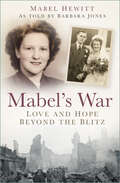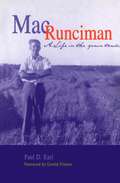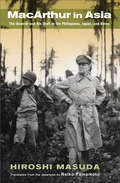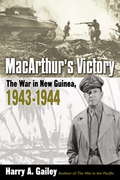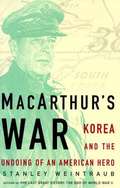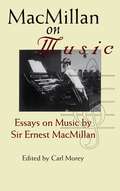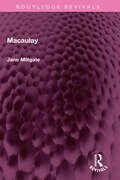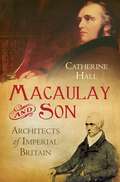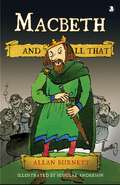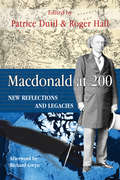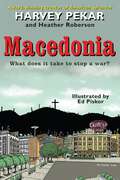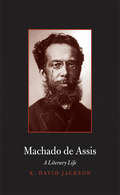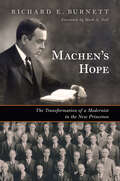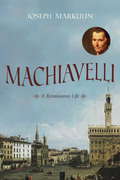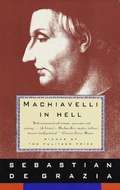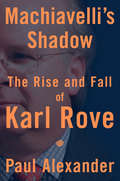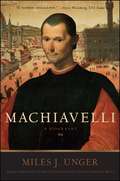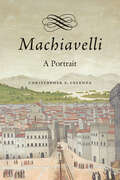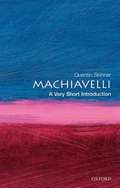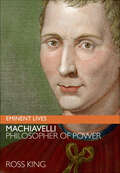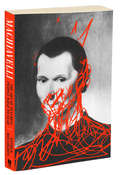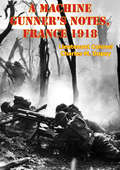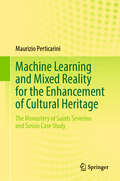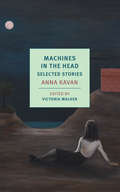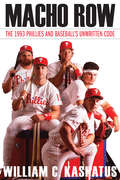- Table View
- List View
Mabel's War: Love and Hope Beyond the Blitz
by Barbara Jones Mabel HewittWith devastating clarity and gentle humour, Mabel Hewitt takes us through her extraordinary life, from her childhood in the shadow of the First World War right up to the present day. Born in the tumultuous thirties, when the threat of the poorhouse hung over working families, she was just 10 years old when war clouds began to gather across Europe. She remembers air-raid sirens, taking shelter underground with her mother and sisters, and the utterly terrifying Coventry Blitz, when almost two-thirds of the city was destroyed or damaged.And yet, despite everything, her spirit shines through. Mabel’s War is a poignant account of love and hope during some of the country’s darkest days.
Mac Runciman: A Life in the Grain Trade
by Paul D. EarlOne of the most turbulent periods in the history of prairie agriculture is chronicled in a new book about the life and times of Alexander "Mac" Runciman, the Saskatchewan farmer who led the United Grain Growers as president from 1961 to 1981. Mac Runciman earned the respect and admiration on both sides of the great agriculture debates of the 1960s and 1970sófrom individual farmers to Pierre Trudeau, who offered Runciman a cabinet post in 1980 (Mac turned him down).Mac Runciman: A Life in the Grain Trade tells the story of how Runciman rose through the ranks of the UGG to play a central role in the fierce debates over the modernization of grain handling, subsidized freight rates, and the role of The Canadian Wheat Board. Runciman's reminiscences give new insights into the events and personalities of that critical period in Canadian agricultural history, a time in which the rural community began to question highly centralized and regulated marketing and transportation systems. The events and decisions of those years continue to reverberate in today's controversies over grain marketing and grain transportation.
MacArthur in Asia: The General and His Staff in the Philippines, Japan, and Korea
by Hiroshi Masuda Reiko YamamotoGeneral Douglas MacArthur's storied career is inextricably linked to Asia. His father, Arthur, served as Military Governor of the Philippines while Douglas was a student at West Point, and the younger MacArthur would serve several tours of duty in that country over the next four decades, becoming friends with several influential Filipinos, including the country's future president, Emanuel L. Quezon. In 1935, he became Quezon's military advisor, a post he held after retiring from the U.S. Army and at the time of Japan's invasion of 1941. As Supreme Commander for the Southwest Pacific, MacArthur led American forces throughout the Pacific War. He officially accepted Japan's surrender in 1945 and would later oversee the Allied occupation of Japan from 1945 to 1951. He then led the UN Command in the Korean War from 1950 to 1951, until he was dismissed from his post by President Truman.In MacArthur in Asia, the distinguished Japanese historian Hiroshi Masuda offers a new perspective on the American icon, focusing on his experiences in the Philippines, Japan, and Korea and highlighting the importance of the general's staff-the famous "Bataan Boys" who served alongside MacArthur throughout the Asian arc of his career-to both MacArthur's and the region's history. First published to wide acclaim in Japanese in 2009 and translated into English for the first time, this book uses a wide range of sources-American and Japanese, official records and oral histories-to present a complex view of MacArthur, one that illuminates his military decisions during the Pacific campaign and his administration of the Japanese Occupation.
MacArthur's Victory: The War in New Guinea, 1943-1944
by Harry A. GaileyA GREAT WARRIOR AT THE PEAK OF HIS POWERS. In March 1942, General Douglas MacArthur faced an enemy who, in the space of a few months, captured Malaya, Burma, the Philippines, the Dutch East Indies, and, from their base at Raubaul in New Britain, threatened Australia. Upon his retreat to Australia, MacArthur hoped to find enough men and matériel for a quick offensive against the Japanese. Instead, he had available to him only a small and shattered air force, inadequate naval support, and an army made up almost entirely of untried reservists. Here is one of history's most controversial commanders battling his own superiors for enough supplies, since President Roosevelt favored the European Theater; butting heads with the Navy, which opposed his initiatives; and on his way to making good his promise of liberating the Philippines. In the battles for Buna, Lae, and Port Moresby, the capture of Finschhafen, and other major actions, he would prove his critics wrong and burnish an image of greatness that would last through the Korean War. This was the "other" Pacific War: the one MacArthur fought in New Guinea and, against all odds and most predictions, decisively won.
MacArthur's War: Korea and the Undoing of an American Hero
by Stanley WeintraubA careful analysis of the events which led up to General MacArthur's removal from command.
MacMillan on Music: Essays by Sir Ernest MacMillan
by Ernest Macmillan Carl MoreyIn addition to his activities as conductor, administrator, educator, composer, and organist, Sir Ernest MacMillan (1893-1973) found time to write more than one hundred essays and lectures on music. Always ready to use his enormous prestige to further the causes of music, MacMillan took every opportunity to admonish Canadians to develop our own composers, to honour our own performers, to educate our children musically, and to offer opportunities for all to hear, learn about, and enjoy great music.This selection of twenty essays and lectures covers the period from 1928 to 1964, and ranges over the gamut of MacMillan’s life and interests: the cause of the Canadian composer; music education for adults as well as children; critical reviews; his early years as an organist; internment in a German prison camp during the First World War; Shakespeare and music; church music; and the lighter side in two humorous send-ups of academic lectures on Bach and Wagner. Here is a panorama of music over thirty-five years at mid-century, through the eyes of one of Canada’s most brilliant and all-embracing musicians.
Macaulay (Routledge Revivals)
by Jane MillgateFirst published in 1973 Macaulay explores important aspects of the interrelationship between Macaulay’s literary and political careers, sets his achievements as an author within the context of his achievements as a public man, and examines some of the sources of his popularity and success. In doing so, it draws extensively on Macaulay’s journals and other papers at Trinity College, Cambridge and elsewhere. The emphases of the book are critical, not biographical, its essential aims the exploration of the range and quality of Macaulay’s writing and the demonstration of the validity of continuing to approach him- above all in mature essays and the History of England - as a narrative artist. This book is a must read for students of education, history of education, and British history.
Macaulay and Son
by Catherine HallThomas Babington Macaulay’sHistory of Englandwas a phenomenal Victorian best-seller defining a nation’s sense of self, its triumphant rise to a powerfully homogenous nation built on a global empire and its claim to bethemodern nation, marking the route to civilization for all others. In this book Catherine Hall explores the emotional, intellectual, and political roots of Zachary Macaulay, the leading abolitionist, and his son Thomas’s visions of race, nation, and empire. The contrasting moments of evangelical humanitarianism and liberal imperialism are read through the writings and careers of the two men.
Macbeth and All That (The And All That Series)
by Allan BurnettThe illustrated true history of the 11th-century Scottish king made famous by William Shakespeare&’s play.Macbeth And All That is a real-life adventure packed with historical facts about Scotland&’s infamous king. Journey back to the dark ages where the throne is splattered in blood and death lurks in every corner. Join Macbeth&’s quest for power—and find out why the truth is very different from the way Shakespeare told it. Groaning with great illustrations, Macbeth And All That is a chilling murder mystery that will keep you guessing to the very end!
Macdonald at 200: New Reflections and Legacies
by Roger Hall Patrice DutilA modern look at a classic leader. Macdonald at 200 presents fifteen fresh interpretations of Canada’s founding Prime Minister, published for the occasion of the bicentennial of his birth in 1815. Well researched and crisply written by recognized scholars and specialists, the collection throws new light on Macdonald’s formative role in shaping government, promoting women’s rights, managing the nascent economy, supervising westward expansion, overseeing relations with Native peoples, and dealing with Fenian terrorism. A special section deals with how Macdonald has (or has not) been remembered by historians as well as the general public. The book concludes with an afterword by prominent Macdonald biographer Richard Gwyn. Macdonald emerges as a man of full dimensions — an historical figure that is surprisingly relevant to our own times.
Macedonia: What Does It Take to Stop a War?
by Harvey Pekar Heather Roberson“Pekar has proven that comics can address the ambiguities of daily living, that like the finest fiction, they can hold a mirror up to life.”–The New York TimesFor years Heather Roberson, a passionate peace activist, has argued that war can always be avoided. But she has repeatedly faced counterarguments that fighting is an inescapable consequence of world conflicts. Indeed, Heather finds proving her point to be a little tricky without examples to bolster her case. So she does something a little crazy: She sets out for far-off Macedonia, a landlocked country north of Greece and west of Bulgaria, to explore a region that has edged–repeatedly–close to the brink of violence, only to refrain. In the process–and as vividly portrayed by the talented duo of Harvey Pekar and Ed Piskor–Heather is tangled in red tape, ripped off by cabdrivers and hotel clerks, hit on by creepy guys, secretly photographed, and mistaken for a spy. She also creates unlikely friendships, learns that getting lost means seeing something new, and makes some startling discoveries. War is hell and peace is difficult–but conflict is always necessary. “Harvey Pekar wrestles the kind of things most comic book heroes wouldn’t touch with a laser blaster.”–Cleveland Plain Dealer“A visit with Harvey Pekar . . . will cause you to reexamine your own life . . . just as the greatest literature will.”–The Austin Chronicle“Pekar lets all of life flood into his panels: the humdrum and the heroic, the gritty and the grand.”–The New York Times Book Review
Machado de Assis
by K. David JacksonNovelist, poet, playwright, and short story writer Joaquim Maria Machado de Assis (1839-1908) is widely regarded as Brazil's greatest writer, although his work is still too little read outside his native country. In this first comprehensive English-language examination of Machado since Helen Caldwell's seminal 1970 study, K. David Jackson reveals Machado de Assis as an important world author, one of the inventors of literary modernism whose writings profoundly influenced some of the most celebrated authors of the twentieth century, including José Saramago, Carlos Fuentes, and Donald Barthelme. Jackson introduces a hitherto unknown Machado de Assis to readers, illuminating the remarkable life, work, and legacy of the genius whom Susan Sontag called "the greatest writer ever produced in Latin America" and whom Allen Ginsberg hailed as "another Kafka. " Philip Roth has said of him that "like Beckett, he is ironic about suffering. " And Harold Bloom has remarked of Machado that "he's funny as hell. "
Machen's Hope: The Transformation of a Modernist in the New Princeton
by Richard E. BurnettThe first critical biography of J. Gresham Machen, examining the full arc of his intellectual career J. Gresham Machen is known as a conservative hero of the fundamentalist-modernist controversy. But was he always so staunchly antimodernist? In this sweeping new biography, Richard E. Burnett examines the whole of Machen&’s life and career—from his early years at Princeton, to his experience in the First World War, to his founding of Westminster Theological Seminary . Burnett pays special attention to topics that have received little attention from biographers, like Machen&’s crisis of faith and his support for historical criticism of Scripture. Incorporating all of Machen&’s major works as well as his previously unpublished private correspondence, Burnett crafts a nuanced narrative of Machen&’s intellectual journey from enthusiastic modernist to stalwart conservative. Nuanced and thorough, Machen&’s Hope will challenge scholars&’ assumptions about Machen and his dynamic era.
Machiavelli
by Joseph MarkulinThis epic piece of storytelling brings the world of fifteenth-century Italy to life as it traces Machiavelli's rise from young boy to controversial political thinker. The often-vilified Renaissance politico and author of The Prince comes to life as a diabolically clever, yet mild mannered and conscientious civil servant. Author Joseph Markulin presents Machiavelli's life as a true adventure story, replete with violence, treachery, heroism, betrayal, sex, bad popes, noble outlaws, deformed kings, menacing Turks, even more menacing Lutherans, unscrupulous astrologers, untrustworthy dentists--and, of course, forbidden love. While sharing the stage with Florence's Medici family, the nefarious and perhaps incestuous Borgias, the artists Leonardo da Vinci and Michelangelo, and the doomed prophet Savonarola, Machiavelli is imprisoned, tortured, and ultimately abandoned. Nevertheless, he remains the sworn enemy of tyranny and a tireless champion of freedom and the republican form of government. Out of the cesspool that was Florentine Renaissance politics, only one name is still uttered today--that of Niccolo Machiavelli. This mesmerizing, vividly told story will show you why his fame endures.From the Trade Paperback edition.
Machiavelli in Hell
by Sebastian De GraziaIn this intellectual biography, de Grazia presents a new vision of Niccolo Machiavelli that evokes the great Florentine thinker's presence. After giving an engrossing account of Machiavelli's childhood and period of personal crisis that followed his imprisonment and torture, the book turns to an examination of The Prince.<P><P> Pulitzer Prize Winner
Machiavelli's Shadow: The Rise and Fall of Karl Rove
by Paul AlexanderKarl Rove has come to personify scorched earth political tactics and merciless, win-at-any-cost trickery. His status as the so-called architect behind Bush's election victories has elevated him to a mythic kingmaker in the national imagination. Not since Mark Hanna, special assistant to President William McKinley, has someone not elected to public office played such a vital role in the governance of our nation. We know the myth, but who is the man? In Machiavelli's Shadow, the full, unvarnished truth about the mastermind of the Bush administration is revealed as swirling scandals and Karl Rove's diminished power have freed people to speak candidly as never before. Acclaimed author and veteran journalist Paul Alexander tracks Rove's journey from consummate outsider to presidential consigliere, conducting firsthand interviews with A-list sources who have never gone on the record about Rove before now. The result is a gripping, no-holds-barred account of the man whose insistence on politicizing any area on which he has advised the president—from the war in Iraq to domestic issues like Social Security, energy, the environment, and hotly controversial judicial matters—has brought about his own fall from grace and an escalating crisis within the government and the nation. Drawing on the author's extensive connections in the political arena and delving into all areas of Rove's life—political, business, psychological, and personal—this book stands as the definitive portrait of one of the most fascinating figures ever to emerge on the American political scene.
Machiavelli: A Biography
by Miles J. UngerHe is the most infamous and influential political writer of all time. His name has become synonymous with cynical scheming and the selfish pursuit of power. Niccolò Machiavelli, Florentine diplomat and civil servant, is the father of political science. His most notorious work, The Prince, is a primer on how to acquire and retain power without regard to scruple or conscience. His other masterpiece, The Discourses, offers a profound analysis of the workings of the civil state and a hardheaded assessment of human nature. Machiavelli’s philosophy was shaped by the tumultuous age in which he lived, an age of towering geniuses and brutal tyrants. He was on intimate terms with Leonardo and Michelangelo. His first political mission was to spy on the fire-and-brimstone preacher Savonarola. As a diplomat, he matched wits with the corrupt and carnal Pope Alexander VI and his son, the notorious Cesare Borgia, whose violent career served as a model for The Prince. His insights were gleaned by closely studying men like Julius II, the “Warrior Pope,” and his successor, the vacillating Clement VII, as well as two kings of France and the Holy Roman Emperor. Analyzing their successes and failures, Machiavelli developed his revolutionary approach to power politics. Machiavelli was, above all, a student of human nature. In The Prince he wrote a practical guide to the aspiring politician that is based on the world as it is, not as it should be. He has been called cold and calculating, cynical and immoral. In reality, argues biographer Miles Unger, he was a deeply humane writer whose controversial theories were a response to the violence and corruption he saw around him. He was a psychologist with acute insight into human nature centuries before Freud. A brilliant and witty writer, he was not only a political theorist but also a poet and the author of La Mandragola, the finest comedy of the Italian Renaissance. He has been called the first modern man, unafraid to contemplate a world without God. Rising from modest beginnings on the strength of his own talents, he was able to see through the pious hypocrisy of the age in which he lived. Miles Unger has relied on original Italian sources as well as his own deep knowledge of Florence in writing this fascinating and authoritative account of a genius whose work remains as relevant today as when he wrote it.
Machiavelli: A Portrait
by Christopher S. Celenza&“Explores why . . . The Prince . . . continues to enthrall readers and . . . can help enrich the way we understand [the statesman]. . . . A compelling portrait&” (Kirkus Reviews). The man whose name is shorthand for all that is ugly in politics was more nuanced than his reputation suggests. Christopher Celenza&’s portrait of Machiavelli removes the varnish to reveal not just the hardnosed philosopher but the skilled diplomat, learned commentator on ancient history, comic playwright, tireless letter writer, and thwarted lover. &“Machiavellian. The very word calls up images of plots, daggers and devious minds. Christopher Celenza separates the man from the melodrama.&” —Sydney Morning Herald &“Both readable and trustworthy.&” —Steve Donoghue, Open Letters Monthly &“Demonstrates how Machiavelli&’s thoughts on conflict and leadership are relevant to today&’s political world.&” —Choice &“By setting the author of The Prince in his historical context, Christopher Celenza captures the brilliance, risk-taking, danger, and sheer exuberant delight of the Italian Renaissance . . . Celenza enables us to seize upon what continues to be relevant in [Machiavelli&’s] work to our own time and place.&” —Stephen Greenblatt, Pulitzer Prize–winning author of The Swerve: How the World Became Modern &“Celenza&’s Machiavelli is a man passionately engaged in history, a scholar of the past whose interests run from the remote annals of ancient Rome to the tormented chronicles of early modern Italy, and an unflaggingly committed participant in the events of his own time. The result is a singularly humane portrait of a wise man making his way through what was often a cruel, chaotic world.&” —Ingrid Rowland, University of Notre Dame
Machiavelli: A Very Short Introduction
by Quentin SkinnerI think of Machiavelli essentially as the exponent of a neo-classical form of humanist political thought. I argue in addition that the most original and creative aspects of his political vision are best understood as a series of polemical -- sometimes even satirical -- reactions against the humanist assumptions he inherited and basically continued to endorse. While my principal aim has been to provide a straightforward introduction to Machiavelli's views on statecraft, I hope that this interpretation may also be of some interest to specialists in the field.
Machiavelli: Philosopher of Power (Eminent Lives)
by Ross KingNew York Times bestselling author Ross King’s biography Machiavelli is “a convincing portrait of one of the most misunderstood thinkers of all time.”*The author of The Prince—his controversial handbook on power, which is one of the most influential books ever written—Niccolò Machiavelli (1469–1527) was no prince himself. Born to an established middle-class family, Machiavelli worked as a courtier and diplomat for the Republic of Florence and enjoyed some small fame in his time as the author of bawdy plays and poems. In this discerning biography, Ross King rescues Machiavelli’s legacy from caricature, detailing the vibrant political and social context that influenced his thought and underscoring the humanity of one of history’s finest political thinkers.“Provides a strong sense of the history of both the man and his times and a nice introduction to Machiavelli’s writings. Moreover, like one of Machiavelli’s bawdy plays, it is a riveting and exhilarating read, full of salacious details and brisk prose.” —Publishers Weekly (Starred Review)“An engaging, revealing biography and a vivid portrait of a city-state in turmoil.” —Financial Times
Machiavelli: The Art of Teaching People What to Fear
by Patrick BoucheronIn a series of poignant vignettes, a preeminent historian makes a compelling case for Machiavelli as an unjustly maligned figure with valuable political insights that resonate as strongly today as they did in his time. Whenever a tempestuous period in history begins, Machiavelli is summoned, because he is known as one for philosophizing in dark times. In fact, since his death in 1527, we have never ceased to read him to pull ourselves out of torpors. But what do we really know about this man apart from the term invented by his detractors to refer to that political evil, Machiavellianism?It was Machiavelli's luck to be disappointed by every statesman he encountered throughout his life—that was why he had to write The Prince. If the book endeavors to dissociate political action from common morality, the question still remains today, not why, but for whom Machiavelli wrote. For princes, or for those who want to resist them? Is the art of governing to take power or to keep it? And what is &“the people?&” Can they govern themselves? Beyond cynical advice for the powerful, Machiavelli meditates profoundly on the idea of popular sovereignty, because the people know best who oppresses them.With verve and a delightful erudition, Patrick Boucheron sheds light on the life and works of this unclassifiable visionary, illustrating how we can continue to use him as a guide in times of crisis.
Machine Gunner’s Notes, France 1918 [Illustrated Edition]
by Lieutenant Colonel Charles M. DupuyIncludes The Americans in the First World War Illustration Pack - 57 photos/illustrations and 10 mapsWhen the United States entered the First World War in 1917 the size of the army was tiny in comparison to the European Powers. The long-serving officers of the U.S. army faced the daunting task of licking the new recruits of 1917 into shape for service overseas. Among these officers was Charles Dupuy who was charged with getting his men ready for battle utilising the weapon that had inflicted so much damage during the previous three years - the machine gun. Key to offence or defence, the machine gun companies of the U.S. expeditionary force had to be fast and deadly in the offence and staunch and steadfast in defence. Major Dupuy tells of how he whipped his men into shape and led them to hard fought victory against the Germans on the Western front in 1918.
Machine Learning and Mixed Reality for the Enhancement of Cultural Heritage: The Monastery of Saints Severino and Sossio Case Study
by Maurizio PerticariniThis book addresses the role of modern surveying and representation technologies in preserving and disseminating cultural heritage. A workflow is illustrated, describing the Former Monastery of Ss Severino and Sossio case study, currently the headquarters of the State Archives of Naples, Italy. After offering a historical overview, the work examines the spaces and structure of the building. A methodology for three-dimensional restitution is presented, using low-cost image-based and professional range-based surveying, concluding with recent AI technologies such as NeRF. The research continues with the virtual and augmented restitution of parts of the building that have been modified, lost over the centuries, or are no longer accessible. The Atrio dei Marmi, the Atrio del Platano, and the Sala del Capitolo and Sala del Refettorio are some of the places where the research has focused, creating a BIM model, using AR for precise interventions, and developing an immersive applied game to understand the third level of the monastery, rich in works of art and today also serving as a museum. In the final chapters, a particular focus is placed on the future of representation: new techniques, ongoing developments in AI supporting surveying, and the new possibilities offered by virtual spaces.
Machines in the Head: Selected Stories
by Anna KavanEnter the strange and haunting world of Anna Kavan, author of mind-bending stories that blend science fiction and the author's own harrowing experiences with drug addiction, in this new collection of her best short stories.Anna Kavan is one of the great originals of twentieth-century fiction, comparable to Leonora Carrington and Jean Rhys, a writer whose stories explored the inner world of her imagination and plumbed the depths of her long addiction to heroin. This new selection of Kavan&’s stories gathers the best work from across the many decades of her career, including oblique and elegiac tales of breakdown and institutionalization from Asylum Piece (1940), moving evocations of wartime from I Am Lazarus (1945), fantastic and surrealist pieces from A Bright Green Field (1958), and stories of addiction from Julia and the Bazooka (1970). Kavan&’s turn to science fiction in her final novel, Ice, is reflected in her late stories, while &“Starting a Career,&” about a mercenary dealer of state secrets, is published here for the first time. Kavan experimented throughout her writing career with results that are moving, funny, bizarre, poignant, often unsettling, always unique. Machines in the Head offers American readers the first full overview of the work of a fearless and dazzling literary explorer.
Macho Row: The 1993 Phillies and Baseball's Unwritten Code
by William C. KashatusColorful, shaggy, and unkempt, misfits and outlaws, the 1993 Phillies played hard and partied hard. Led by Darren Daulton, John Kruk, Lenny Dykstra, and Mitch Williams, it was a team the fans loved and continue to love today. Focusing on six key members of the team, Macho Row follows the remarkable season with an up-close look at the players’ lives, the team’s triumphs and failures, and what made this group so unique and so successful. With a throwback mentality, the team adhered to baseball’s Code. Designed to preserve the moral fabric of the game, the Code’s unwritten rules of the game formed the bedrock of this diehard team whose players paid homage and respect to the game at all times. Trusting one another and avoiding ideas of superstardom, they consistently rubbed the opposition the wrong way and didn’t care. William C. Kashatus pulls back the covers on this old-school band of brothers, depicting the highs and lows and their brash style while also digging into the suspected steroid use of players on the team. Macho Row is a story of winning and losing, success and failure, and the emotional highs and lows that accompany them.
